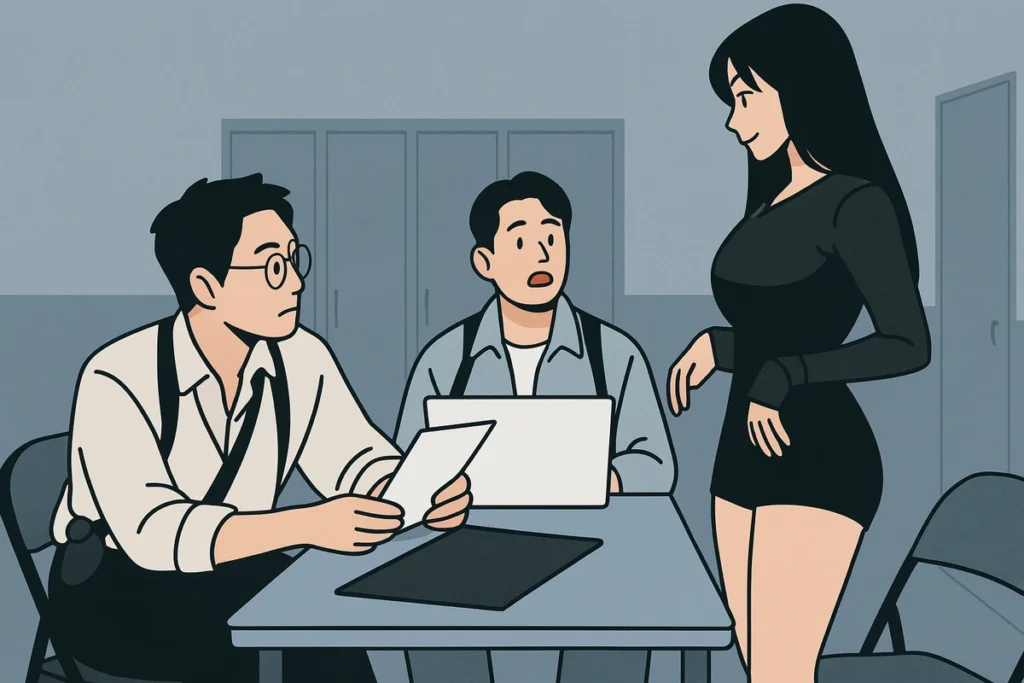[Image Source] Stylized scene generated with DALL·E – inspired by No-Bakku Tak Jae-hoon.
TL;DR – When real-life streamers meet Korean profanity.
On “No-Bakku Tak Jae-hoon,” chaos unfolds as bold YouTuber Gwa-jeup Se-yeon reenacts her fan-requested curse-dance combo—crude, meme-worthy, and painfully awkward.
This post unpacks intense slang like 씨발새끼 and 현타, misused honorifics, and what makes profanity hilarious (or uncomfortable) in real-life settings.
Learn the humor mechanics and social risk behind these phrases—and why “knowing” doesn’t mean “saying.”
Get an uncensored glimpse into how Korean streamers, comedians, and YouTubers use real-life slang—funny, raw, and sometimes profane.
1. “No-Bakku Tak Jae-hoon” – Scene Summary
In this explosive short from the YouTube series “노빠꾸탁재훈 (No-Bakku Tak Jae-hoon)”, Tak Jae-hoon, Shin Gyu-jin, and guest streamer Gwa-jeup Se-yeon dive into a chaotic but hilarious exchange involving slang, dance memes, and full-on profanity.
Se-yeon reenacts a moment where her fans asked her to combine the “Zero Two” dance with one of the harshest Korean curse phrases:
👉 씨발새끼야 좋냐? (“You f***ing bastard, you like this?”)
This turns into a comic back-and-forth, layered with 현타 (reality check) reactions, misused politeness levels, and a confused but entertained host crew.
🔴 Watch the original scene here
[Source] YouTube, 노빠꾸탁재훈
While it would be more convenient for you if we provided the short version, we kindly ask for your understanding as we share the original clip instead, due to copyright and other considerations. For the video related to this post, please watch from 7:29 to 8:28. If you’re familiar with Korean, we recommend watching the full video for the best experience.
2. Key Slang Expressions from the Skit
| Expression | Meaning | Cultural Insight |
| 노빠꾸 (No-Bakku) | “No brakes” – someone with no filter | Comes from “no back (no backing down)” – often describes bold or reckless personalities. |
| 씨발새끼 (Ssi-bal-sae-kki) | “You f***ing bastard” | One of the harshest Korean swear words; extremely vulgar but often used in comedic exaggeration |
| 쪽팔리다 | To be super embarrassed | Slang from “face being sold”; used across age groups now |
| 현타 오다 | Hit by reality | Short for “현실 자각 타임” – used when someone snaps out of a fun/fantasy moment |
| 애들 | “Kids” (casual/slightly rude) | Used even for adult viewers by streamers to show informality or superiority |
| 깼다 | Cringed out, vibe ruined | Means a moment was so awkward or absurd that it killed the mood |
| 나 죽어 | “I’m dying” (emotionally overwhelmed) | A meme-like expression for extreme cuteness, cringe, or excitement |
⚠️ Many of these terms are emotionally loaded or inappropriate in formal settings. Know them, don’t say them. Learn the tone, not just the words.
3. Cultural & Linguistic Breakdown Highlights
3-1. Language Nuance
– “저희도 들어볼 수 있을까요?”
→ Misuse of humble speech. “저희” is overly formal here; “우리” is more natural in casual banter.
– “해 달라길래”
→ Combines indirect request + reason marker:
“They asked me to do it, so I did.”
– “어색하구나”
→ Realization + tone softener. Used when realizing something about the other person on the spot.
3-2. Humor Mechanics
– The punchline works because Gwa-jeup Se-yeon, known for her online boldness, ironically hesitates when cursing in front of real people.
– The awkwardness, combined with Tak Jae-hoon’s dry reaction (“이상한 것 같아”), creates a classic Korean variety moment:
욕을 못하는 사람의 욕이 더 웃긴 이유. (Why it’s funnier when someone who can’t swear tries to swear.)
3-3. Real Expressions with Examples
| Slang | Safer Alternative | Example Sentence |
| 씨발새끼야 | 어이없다 / 미쳤냐? | “미쳤냐, 진짜?” (Are you serious?) |
| 쪽팔리다 | 창피하다 | “조금 창피했어.” (I was a little embarrassed.) |
| 깼다 | 망쳤다 / 분위기 깨졌다 | “그 말에 분위기 확 깼어.” (That comment totally killed the mood.) |
| 현타 오다 | 현실 자각했다 | “끝나고 나서야 현실 자각했어.” (I only came to my senses after it was all over.) |
❓ FAQ (Frequently Asked Questions)
Q1. Is it okay to say “씨발새끼야” if it’s used on YouTube?
👉 Absolutely not. It’s broadcast as a joke, but still one of the most potent curses. Just because it’s laughed at doesn’t mean it’s acceptable to use.
Q2. What’s the meaning of “현타 왔다”?
👉 It means “I just snapped back to reality.” It’s often used after something ridiculous, fun, or emotionally intense.
Q3. Why did Se-yeon say she only curses at text?
👉 She meant she’s used to cursing while reading a monitor script—not at real people. That’s why it felt awkward.
Q4. Is “노빠꾸” a positive or negative word?
👉 Depends on tone. It can describe someone bold and funny—or reckless and tactless.
Q5. What’s a “BJ” in Korea?
👉 “Broadcast Jockey” – a live streamer on platforms like AfreecaTV. Gwa-jeup Se-yeon is one.
4. “No-Bakku Tak Jae-hoon”: Format & Cast
– Tak Jae-hoon: Veteran MC. Blunt but sharp-tongued humor.
– Shin Gyu-jin: Co-host. Often acts as the straight man.
– Gwa-jeup Se-yeon: Viral streamer. Known for bold commentary and edgy style.
This episode stirred controversy for blurring lines between internet streamer culture and mainstream broadcast—but also opened discussion about expression, tone, and language on Korean digital platforms.
📍 Want More Like This?
Explore more posts in our Korean Slang Series and dive deeper into how Koreans express emotion, humor, and social nuance through language.
- 🔖 Korean Slang Decoded: 64 Must-Know Expressions to Speak Like a Local
- 🔖 Korean Abbreviations Explained: A Guide to Modern Slang and Trends
- 🔖 Understanding Korean Ambiguity: A Guide to the Beauty of Multilayered Expressions
- 🔖 Korean Honorifics vs. Informal Speech: Master the Basics with Practical Examples
- 🔖 55 Korean Proverbs You Need to Know: Language and Culture Insights
- 🔖 More from the K-Show Slang Series


